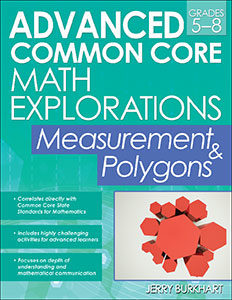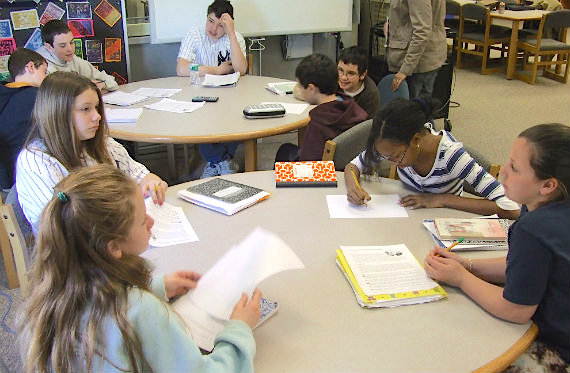Engaging Math Students: Compete or Collaborate?
 By Jerry Burkhart
By Jerry Burkhart
Might the learning experience for math students be changing for the better?
Recently, refreshing new perspectives on math education—and even mathematics itself—have been emerging in social media conversations between math educators and writings by professional mathematicians like Dr. Eugenia Cheng.
These perspectives suggest broader, more inclusive understandings of what it means to learn and create mathematics. The approaching end of the school year with its promise (hopefully!) of a little time for rest and reflection feels like a good opportunity to step back and take stock of some of these big picture issues.
I recently attended a talk by Dr. Cheng (currently Scientist In Residence at the School of the Art Institute of Chicago) that affected me profoundly. Her words resonated with a number of things I have felt for some time but never framed clearly in my own mind.
In retrospect, her ideas also have implications for issues of confidence and creativity in math addressed in my recent MiddleWeb posts. In this article, I would like to share some reflections on a few of her ideas as they relate to these topics and, more particularly, on competition and collaboration in the math classroom.
Different ways of experiencing math

Dr. Eugenia Cheng
If you read or watch movies about highly successful mathematicians, you often hear that math games and competitions played a key role early in their professional development. There is a whole industry built around competitions for promising young mathematicians. Thus, I was surprised and intrigued to hear Dr. Cheng claim that she is fond of neither math games nor competitions.
Think about a traditional math classroom for a moment. The emphasis is on getting correct answers and getting them quickly. Competitive students tend to be the most visible and the most often rewarded. Games and competitions are often preferred methods when it comes to finding ways to engage and excite students. Traditional rationales for using competition even include claims that it develops character.
Clearly, competition may be effective in certain cases and for some students. When I was a student, however, I found it to be more of a hindrance than a help.
I was not interested in racing other students to get the answers. The pressure of competition distracted from my interest in the ideas. And the sense of competition always seemed to be there, even when it was not explicitly designed into the lesson. In my favorite math courses, the teacher allowed us to talk to each other in order to make discoveries and complete our assignments.
When I became a teacher, these early experiences and preferences influenced my instructional methods, though I must admit, I often felt a little strange about doing things differently. After all, some students in my classes were drawn to competition, and they were accustomed to having their preferences validated.
I slowly learned, though, that those who prefer competition do quite a good job of creating it for themselves. On the other hand, those who prefer collaboration and reflection need me to create an environment that makes this possible. Doing so requires a focused effort on my part, because competition is deeply, almost invisibly, ingrained in the structure of traditional math classrooms.
Competition and learning goals
Some argue that competition is valuable as one element in a balanced approach to meeting students’ needs. It certainly seems reasonable that if teachers are careful to account for potential negative consequences, competitive experiences might be designed in such a way as to mitigate these consequences, allowing students to experience primarily the benefits.
Probing more deeply, however, frequent use of competition in math classrooms may be a reflection of the nature of our beliefs about math and our goals for students. Games and competitions that revolve around computational practice are a staple of many math classrooms. As teachers shift the focus of instruction toward making sense of mathematical ideas, competition may lose its effectiveness. In his book, Transformative Classroom Management, John Schindler notes that when a competitive structure is used to achieve such goals,
“The purpose of the activity moves from the learning goals (i.e., engagement in making sense of the elements of the process and the attempt to interpret and make a quality effort) to efficiency, speed, and the outcome relative to others…we can see this change in focus occurring no matter what the teacher may say either to encourage or discourage it.”
A story about competition’s consequences
Recently, while doing some training with teachers, I encountered a striking example of this phenomenon.
We were working on an open-ended task in which the teachers’ job was to view a list of subtraction expressions, look for patterns, and think of questions to ask. For much of the time, everyone was happily engaged in the task if not quite sure where to go with it. Eventually, as the teachers gained confidence, the conversation became excited and intense. A cascade of ideas began flowing, and different groups were making different discoveries.
At one point, we took a break to reflect on how we were feeling about the process. One teacher spoke very honestly and said that she was enjoying it at first, but that she was a very competitive person, and as soon as she saw that others were coming up with ideas that she had not thought of, she lost interest and began to shut down.
To her, succeeding in math had become more about comparing herself favorably to others than understanding new ideas. And this occurred even though the task itself was collaborative.
This teacher’s response made me wonder how many students I have lost in the past during lessons that appeared in my mind to be going beautifully. It also affirmed my intention to have conversations with students about their feelings in class and about competition in particular.
Though my students are not usually as direct and honest as this teacher was, having an opportunity to express their feelings makes the classroom a safer place to learn. The challenge for me becomes taking account all of these feelings.
Not surprisingly, students who are already confident in math are more likely to enjoy competition, while those who doubt their abilities tend to shy away from it. Thus, placing too much emphasis on competition in the classroom may mean that “the rich get richer while the poor get poorer.” Furthermore, there are always students (like myself) who are reasonably confident, but still prefer to learn in less competitive ways.
The role of gender
Cheng herself is quite explicit about her preference for collaboration over competition in the math classroom. She teaches math at an arts college in Chicago, and at the beginning of her courses, she makes it clear how things will proceed.
In order to define the behaviors and attitudes that she values, she has coined the terms ingressive and congressive. She describes them as follows: “Ingressive is about going into things and not being waylaid by what people think or by emotions, and congressive is about bringing people with you and bringing people together and unifying and making connections between things.” (This quote comes from a 2017 podcast, “Category Theory for Normal Humans.” To learn more about her ingressive/congressive distinction, see this list of characteristics.)
Perhaps these definitions remind you of traditional gender distinctions (ingressive as male and congressive as female). In fact, Cheng coined the terms precisely in order to address the behaviors directly without getting sidetracked by issues of gender.
I find this to be a particularly appealing feature of her work, because, while it is true that making classrooms more congressive is likely to support girls in feeling more confident and interested in math, there are many boys with congressive traits and girls with ingressive traits.
The point is to create classrooms in which collaboration and reflection are valued for their usefulness in making math more accessible and meaningful for everyone. In my experience, classes of this sort support the learning of all students, even those with more competitive inclinations.
Implications for mathematics
Dr. Cheng’s work suggests to me that the issue of competition in the math classroom goes much deeper than teaching techniques. It gets to the very heart of what it means to learn and do mathematics.
She has fascinating things to say about other issues as well, including the role of abstraction in mathematics and the relative value of problem solving vs. creating foundational ideas. I plan to discuss some of Cheng’s ideas about abstraction and creativity in an upcoming post. In the meantime, I hope that you will share some of your thoughts about her ideas and your own experiences around competition and collaboration in the math classroom.
Resources
Greater Than Code podcast, Episode 038: Category Theory for Normal Humans with Dr. Eugenia Cheng
Transformative Classroom Management, by John Schindler
Overcoming Myths About “Being Good at Math”: MiddleWeb article, by Jerry Burkhart
More Ideas to Spark Mathematical Creativity: MiddleWeb article, by Jerry Burkhart
Dr. Cheng has written some books about math. As you will see, she is also a pianist, and she loves food.
How to Bake π, by Eugenia Cheng
Cakes, Custard, and Category Theory: Easy Recipes for Understanding Complex Maths, by Eugenia Cheng
_________________________________

As founder of 5280 Math Education, he helps schools and districts implement research-based programming for gifted math students and offers tools and strategies for developing and nurturing adventurous math learners. Visit his store at MyEdExpert. And read more of his articles here at MiddleWeb.




































